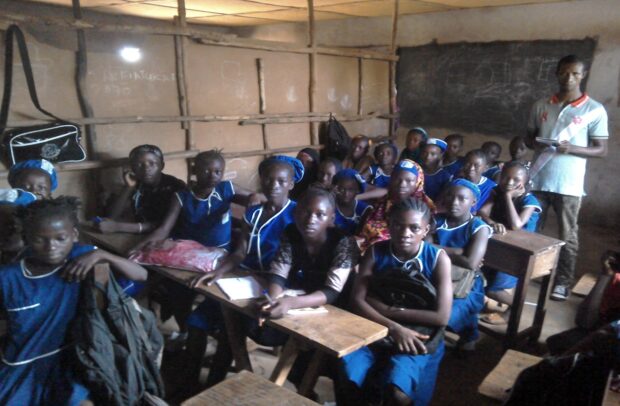
I have recently come back from three months in Sierra Leone where I was working with DFID and the Ministry of Education to support children re-enrolling back into school safely after Ebola. Ebola had a devastating effect on the country, including the closure of schools and colleges for eight months. They reopened again in April and the Ministry of Education was tasked with ensuring that 1.7 million children enrolled back to school safely. It is credit to them that there have been no new cases from schools since they reopened. This blog focuses not on the impact of Ebola on schools, but on the opportunities that the crisis has created for donors to work differently in the education sector in the future. DFID is still scoping its possible support to the sector and recently announced a £240m package to help the Government of Sierra Leone in its plan to recover from the outbreak.
Help the ministry track a few key priorities – the establishment of a Presidential Delivery Unit and the development of an Ebola Recovery and Transition plan have helped the Ministry of Education and partners to focus their efforts to make progress quickly to ensure that infection prevention control is available in all schools, back to school messages reach communities, and schools and teachers are supported to implement an accelerated curriculum. The use of SMS messaging to track and report on progress against key indicators on a regular basis represents a stop change in terms of the availability of data and can be relatively cheaply and easily scaled up to collect data on a wider range of sectoral priorities and embedded into the government’s data collection system.
Make adolescent girls one of those priorities: The status of women and girls in Sierra Leone is among the worst in the world, with gender inequalities deeply embedded in the country’s history and traditions. It ranks 183 out of the 187 on the Gender Inequality Index. Although girls and boys have similar access to primary school, girls are much less likely to progress to secondary school. This is due to a combination of factors, including push factors such as sexual violence in schools, and pull factors such as early marriage. During the Ebola crisis there was a sharp increase in the number of girls getting pregnant while they were off school. An innovative programme with UNICEF and UNFPA is piloting a bridging programme which supports girls with health and education services while they are pregnant and after they give birth. Lessons from this programme could be mainstreamed into a programme focused on girls’ access and learning in secondary school.
Support action at the district level – the Ebola response reinforced the importance of strengthening district capacity to plan, monitor and respond rapidly to events. As decentralised capacity to respond to Ebola is scaled back, DFID should explore how to build more capacity into District offices so that they can plan and manage basic services better and improve the collection and use of resources. This support should be focused in those districts where the problem of girls’ participation and performance is lagging furthest behind. Training, personnel and resources are all needed to increase the capacity of District teams to manage and coordinate service delivery. One key function would be capacity building to ensure that data is used effectively to make decisions at District level.
Explore a range of delivery channels: The Ebola crisis has created an opportunity to look differently at its delivery channels for aid to the sector. Pre Ebola donor funding to basic education was mainly delivered through UNICEF and NGOs. The Ministry was receiving some technical assistance but governance concerns mean that it is not possible to put sector funding directly through them. There is an opportunity to discuss with government the potential for how the private sector could help to deliver funding to the most vulnerable and provide technical assistance and support in the places and to the children who most need it. There is also more work that could be done to increase the coordination of NGO support and strengthen our engagement with private and community schools where they are serving the poor.
Foster greater community engagement: An important part of the Ebola response has been to engage communities in service delivery much more closely than in the past. Community based social mobilisation and surveillance has been key to the changes in behaviours which have led to a reduced number of Ebola cases. Communities have a strong role to play in the monitoring of important indicators of service delivery, but communities also have a capacity to contribute directly to improving health and education. Youth groups have been especially involved and keeping them engaged should be a priority. There are opportunities both with respect to monitoring school quality, and also changing cultural attitudes towards education of vulnerable groups.

Recent Comments